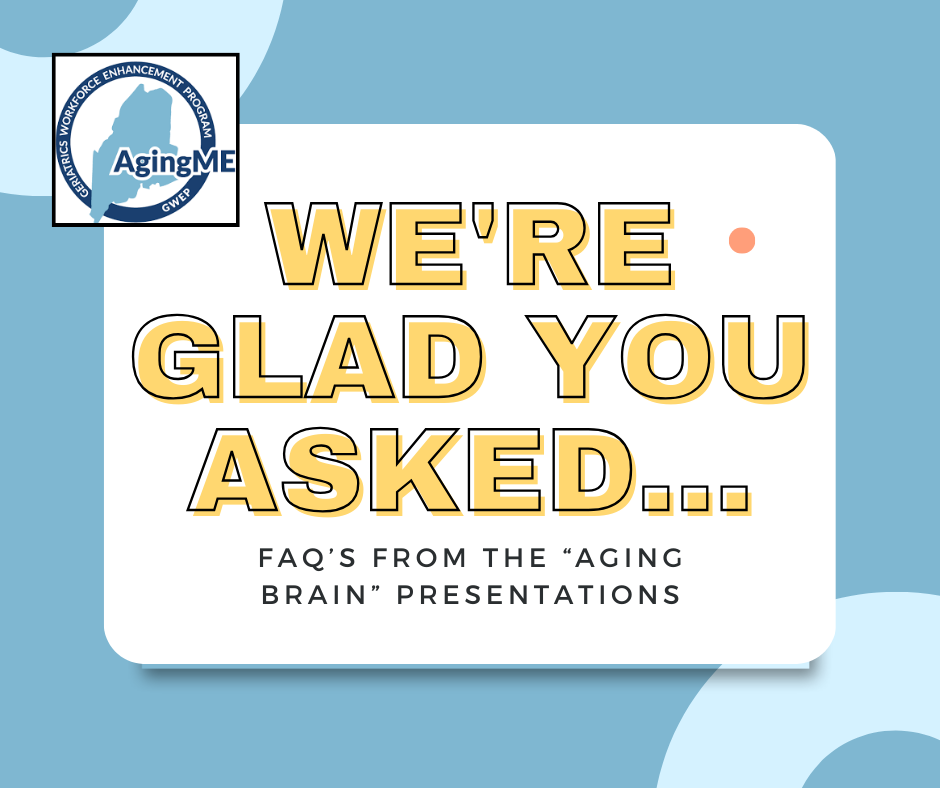
Frequently Asked Questions From the “Aging Brain” presentations
Susan Wehry, M.D. started the Aging Brain presentations as a way to spread information about the brain as we age and to alleviate worries relating to dementia among older adults. At these presentations, several questions commonly pop up. Here, you will find Dr. Wehry’s answers to the frequently asked questions, as well as questions that were not answered at the presentation itself!
Have you ever heard of Dr. Frank Shallenburger?
At a recent Aging Brain presentation in Dexter, a participant asked if I had heard of Dr. Frank Shallenberger. I had not, so I thought I’d check him out. Here is what I learned:
Dr. Frank Shallenberger is controversial. Opinions on him range from a cutting-edge alternative medicine genius to a snake oil charlatan. Here is the evidence for and against his approach.
FOR:
- Anecdotal evidence: Many of his patients report positive experiences with his treatments, often in cases where conventional medicine has failed. This anecdotal evidence forms the basis of his reputation as a successful alternative practitioner.
- Focus on holistic health: He advocates for a holistic approach to health, considering factors like diet, lifestyle, and emotional well-being alongside physical ailments.
- Some scientific basis for some treatments: Some of his practices, like acupuncture and herbal medicine, have some scientific backing for their potential benefits in specific conditions. However, the evidence for their effectiveness in the ways he uses them is often limited or controversial.
AGAINST:
- Lack of rigorous scientific evidence: Many of his claims lack strong scientific backing through controlled clinical trials, making it difficult to verify their effectiveness.
- Questionable practices: Some of his treatments lack scientific plausibility and raise concerns about their validity.
- Exaggerated claims and potential harm: Some critics argue he exaggerates the effectiveness of his treatments and may discourage patients from seeking necessary conventional medical care, potentially leading to harm.
- Disciplinary actions: Dr. Shallenberger has faced disciplinary actions from medical boards in the past, raising concerns about his professional conduct. I reviewed these legal actions, which are public documents, and found them very concerning,
Overall, the evidence for and against Dr. Shallenberger’s approach is mixed. While he has some supporters who credit him with improving their health, his claims lack strong scientific backing and some of his practices raise concerns. Ultimately, it’s up to each individual to weigh the evidence and decide for themselves what to make of Dr. Frank Shallenberger’s treatments
Bottom line: Remember, it’s always best to consult with a qualified medical professional before making any decisions about your health.
Here are some additional resources that might help you form your own opinion:
- Consumer WatchDog: https://quackwatch.org/cases/board/med/shallenberger/ and
- AntiAging Website: https://www.antiagingmedicine.com/staff/frank-shallenberger/
Is red wine good for you?
What’s moderate consumption? No more than 1 drink/day for women and not more than 2/day for men (with 2 days “off” per week)
What’s a drink? A drink is defined as:

- 12 ounces (355 milliliters) of regular beer.
- 5 ounces (148 milliliters) of wine.
- 1.5 ounces (44 milliliters) of hard liquor or distilled spirits.
